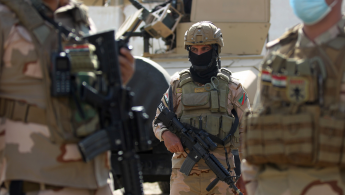Rockets target Iraqi airbase hours after deadly IS clashes
The attack came hours after Iraqi security forces raided an Islamic State hideout in the plains of Tarmiyah, with clashes leaving five jihadists and two pro-government fighters dead, according to the Iraqi military.
F-16s at the Al-Balad airbase were backing the ongoing Tarmiyah operation against IS sleeper cells at the time of the rocket attack, two security sources told AFP.
There was no immediate claim of responsibility and it was not clear whether the rocket attack was linked to the anti-IS operations.
Al-Balad is around 60 kilometres (40 miles) north of Tarmiyah.
A local army source told AFP that Katyusha-style rockets were fired at Al-Balad.
One of the rockets hit a part of the base hosting employees of Sallyport, the US contractor charged with maintaining the F-16 aircraft purchased from the US in recent years, the security sources said.
"An Iraqi contractor sustained moderate injuries," one of the sources said.
Twitter Post
|
Another rocket hit a runway, without disrupting the take-off and landing of aircraft, while a third hit nearby woodlands, the source said.
Coalition drawdown
Iraqi army units at Al-Balad responded to the rockets by firing artillery at a position 12 kilometres east of the airbase where they believed the attack originated, the source added.
It is rare for Iraqi security forces to respond so quickly to such an incident.
Dozens of rocket attacks and roadside bombs targeted Western military and diplomatic installations last year.
US and Iraqi officials have blamed the attacks on armed factions with close ties to Iran - not IS.
Iraqi authorities have struggled to hold the perpetrators of rocket attacks to account, as some of the groups accused are integrated into the state security forces and wield significant influence.
The rocket attacks continued even as the US-led coalition, which helped Iraq declare defeat against IS in 2017, drew down its forces and consolidated bases.
Al-Balad, one of the bases from which the coalition withdrew, once held a small US Air Force contingent but now hosts Iraqi armed forces and the Sallyport contractors.
The US-led coalition has roughly halved its forces over the last year, leaving around 3,500 troops.
They are now based in Baghdad near the US embassy, as well as Ain al-Assad in the country's west and Arbil, the capital of the northern Kurdistan region.
Anti-IS operations ramp up
The coalition still provides surveillance support and air strikes to help Iraqi forces chase down IS sleeper cells in desert or mountainous areas.
Its Arbil base was targeted on Monday night in a volley of rockets that killed one foreign contractor and wounded several others, as well as a US soldier.
Saturday's violence comes nearly one month to the day after twin suicide bombers killed more than 30 people in the packed Tayaran Square, the bloodiest such attack in Baghdad in three years.
Security sources said the two jihadists had infiltrated the city from the north.
A few days later, nearly a dozen fighters from Iraq's Hashed al-Shaabi, a powerful network of state-sponsored groups, were killed in an IS ambush -- also north of the capital.
Since then, security forces have ramped up their efforts to hunt IS sleeper cells there, with Prime Minister Mustafa al-Kadhemi announcing the killing of Abu Yasser al-Issawi, identified as the top IS figure in Iraq, on January 28.
In early February, security forces killed another IS leader who they believed helped transport the twin bombers into Baghdad.
Iraq declared IS territorially defeated in late 2017 after a three-year fight aided by US-led coalition air strikes and military advisors.
Agencies contributed to this report.
Follow us on Facebook, Twitter and Instagram to stay connected





 Follow the Middle East's top stories in English at The New Arab on Google News
Follow the Middle East's top stories in English at The New Arab on Google News
![The UAE is widely suspected of arming the RSF militia [Getty]](/sites/default/files/styles/image_330x185/public/2024-11/GettyImages-472529908.jpg?h=69f2b9d0&itok=Yauw3YTG)
![Netanyahu furiously denounced the ICC [Getty]](/sites/default/files/styles/image_330x185/public/2024-11/GettyImages-2169352575.jpg?h=199d8c1f&itok=-vRiruf5)
![Both Hamas and the Palestinian Authority welcomed the ICC arrest warrants [Getty]](/sites/default/files/styles/image_330x185/public/2024-11/GettyImages-2178351173.jpg?h=199d8c1f&itok=TV858iVg)